1 Chronicles 24 meaning explained in AI Summary
This chapter details the organization of priests and Levites for temple service, instituted by King David and carried out by his son, Zadok the priest, and Ahimelech the son of Abiathar.
Key Points:
- Divisions by Lot: The descendants of Aaron were divided into 24 priestly divisions to serve in the temple, each with a designated leader. The selection was done impartially by casting lots (verses 1-19).
- Listing of Divisions: The chapter meticulously lists each division, its leader, and the order in which they were chosen by lot (verses 7-18).
- Levites Included: The chapter briefly mentions that the Levites were also organized into divisions for their specific temple duties (verse 19).
Purpose:
- Organization: To establish a structured system for priestly and Levitical service in the temple, ensuring efficiency and fairness.
- Genealogy: To record the lineage of the priests and their assigned divisions for future generations.
- God's Order: To demonstrate God's order and intentionality in every aspect of temple worship, even down to the selection of who served and when.
Overall: 1 Chronicles 24 highlights the importance of order and lineage in the priesthood, emphasizing God's meticulous plan for worship and service in the temple.
1 Chronicles 24 bible study ai commentary
1 Chronicles 24 establishes the organization of the Aaronic priesthood into 24 divisions to ensure the perpetual, orderly, and divinely-ordained service of the Tabernacle and the future Temple. The chapter underscores that sacred worship is not a human invention but a matter of divine command, implemented through a process—the casting of lots—that removes human partiality and reveals God's will. It serves as a blueprint for holiness, duty, and structured ministry, a theme that reverberates through Israel's history and finds its ultimate fulfillment in the New Covenant.
1 Chronicles 24 context
The Chronicler wrote for a post-exilic Jewish community rebuilding its identity and institutions. This chapter was crucial for establishing legitimacy and continuity for the Second Temple priesthood, tracing its lineage and duties directly back to Aaron and the revered King David. It grounds the current temple operations in a sacred, divinely-sanctioned history. The meticulous listing and the use of the sacred lot polemically contrast Israel's God-ordained worship with the often chaotic and self-serving religious practices of neighboring cultures, asserting that Israel's God is a God of order and precision.
1 Chronicles 24:1-2
Now the divisions of the sons of Aaron were these. The sons of Aaron: Nadab, Abihu, Eleazar, and Ithamar. But Nadab and Abihu died before their father and had no children, so Eleazar and Ithamar became the priests.
In-depth-analysis
- Genealogical Preamble: The chapter opens by anchoring the priesthood firmly in the lineage of Aaron, Moses' brother, as established in the Torah.
- Tragic Reminder: The immediate mention of Nadab and Abihu serves as a stark warning. Their death for offering "unauthorized fire" (Leviticus 10) underscores the non-negotiable requirement for holiness, obedience, and adherence to divine instruction in priestly service.
- Succession: Their childless death explains why the entire priesthood subsequently descended from only two sons, Eleazar and Ithamar, setting the stage for the division that follows.
Bible references
- Leviticus 10:1-2: "Nadab and Abihu... offered unauthorized fire before the LORD... and they died before the LORD." (The historical event being referenced).
- Numbers 3:4: "Nadab and Abihu died before the LORD... and they had no sons, so Eleazar and Ithamar served as priests..." (A direct parallel account).
Cross references
Exod 28:1 (Original call of Aaron and sons); Num 26:60-61 (Genealogical record).
1 Chronicles 24:3-6
With the help of Zadok of the sons of Eleazar, and Ahimelech of the sons of Ithamar, David organized them according to the appointed duties in their service. Since there were more chief men found among the sons of Eleazar than among the sons of Ithamar, they organized them under sixteen heads of fathers' houses of the sons of Eleazar, and eight of the sons of Ithamar. They organized them by lot, all alike, for there were officers of the sanctuary and officers of God among both the sons of Eleazar and the sons of Ithamar. And the scribe Shemaiah the son of Nethanel, a Levite, recorded them in the presence of the king and the princes and Zadok the priest and Ahimelech the son of Abiathar and the heads of the fathers' houses of the priests and of the Levites, one father's house being taken for Eleazar and one taken for Ithamar.
In-depth-analysis
- Unified Leadership: David collaborates with both priestly lines: Zadok (from Eleazar) and Ahimelech (from Ithamar). This demonstrates David's wisdom in unifying the two major priestly factions under his royal administration, ensuring broad support and legitimacy.
- Proportional Representation: The division acknowledges a demographic reality: Eleazar's line had more "chief men" or family heads (16) than Ithamar's (8). The organization is practical, based on existing family structures.
- Divine Selection by Lot: The use of the lot (goral) is central. This was a sacred method for discerning God’s will, preventing accusations of favoritism or political maneuvering. It affirmed that the service schedule was not David's choice but God's. The phrase "all alike" emphasizes the equality of opportunity and standing before God, regardless of which line a priest came from.
- Official Ratification: The process is meticulously documented by a scribe in the presence of a full assembly of witnesses: the king, civil leaders (princes), the two leading priests, and the heads of the families. This gives the resulting list official, legal, and spiritual authority for all future generations. The final phrase "one... taken for Eleazar and one taken for Ithamar" might describe the method of drawing lots to ensure fair distribution of the weekly turns.
Bible references
- Proverbs 16:33: "The lot is cast into the lap, but its every decision is from the LORD." (The principle behind using lots).
- Acts 1:26: "And they cast lots for them, and the lot fell on Matthias..." (The same method used by the apostles to choose a replacement for Judas).
- Luke 1:5, 8: "a priest named Zechariah, of the division of Abijah... he was serving as priest before God when his division was on duty..." (Direct NT fulfillment/continuation of this system).
Cross references
1 Sam 22:20-23 (History of the line of Ithamar via Abiathar); 2 Sam 8:17 (Zadok and Ahimelech serving as priests); 1 Chr 15:11 (David calling Zadok and Abiathar for service); Josh 18:10 (Joshua using lots to divide the land).
Polemics: Some scholars suggest a polemical element in favor of the Zadokite priesthood (Eleazar's line), which became dominant after Solomon deposed Abiathar (Ithamar's line). By noting their numerical superiority (16 to 8) and listing them first, the Chronicler subtly validates the historical ascendancy of the Zadokites while still showing David's original intention of fairness.
1 Chronicles 24:7-18
The first lot fell to Jehoiarib, the second to Jedaiah, the third to Harim, the fourth to Seorim, the fifth to Malchijah, the sixth to Mijamin, the seventh to Hakkoz, the eighth to Abijah, the ninth to Jeshua, the tenth to Shecaniah, the eleventh to Eliashib, the twelfth to Jakim, the thirteenth to Huppah, the fourteenth to Jeshebeab, the fifteenth to Bilgah, the sixteenth to Immer, the seventeenth to Hezir, the eighteenth to Happizzez, the nineteenth to Pethahiah, the twentieth to Jehezkel, the twenty-first to Jachin, the twenty-second to Gamul, the twenty-third to Delaiah, the twenty-fourth to Maaziah.
In-depth-analysis
- The 24 Courses: This list is the core result of the process. It forms a rotational schedule where each of the 24 priestly families would serve in the Temple for one week, twice a year (plus during major festivals). This system ensured continuous worship.
- Order of Honor: Being chosen first (Jehoiarib) was a position of honor. This family would later gain fame as the lineage of the Maccabees (1 Maccabees 2:1).
- Continuity: Many of these family names reappear in the books of Ezra and Nehemiah, demonstrating that this system was revived after the Babylonian exile and was foundational to Second Temple worship.
- Historical Markers: The eighth division, Abijah, is specifically named in the New Testament as the division of Zechariah, the father of John the Baptist (Luke 1:5). This provides a direct, concrete link between the Davidic organization of worship and the events surrounding the birth of Christ.
Bible references
- Luke 1:5: "...a priest named Zechariah, of the division of Abijah..." (The eighth course listed in verse 10).
- Nehemiah 12:4, 17: "...Jedaiah, Harim, Jedaiah..." (Lists priestly families who returned from exile, including many names from this list, showing the system's restoration).
- Ezra 2:36-39: "The priests: the sons of Jedaiah... of Immer... of Pashhur... of Harim..." (Records the return of four of these specific priestly families).
Cross references
Neh 10:2-8 (Priests who signed the covenant); Neh 12:12-21 (Lists of priestly families in the days of Joiakim); 1 Maccabees 2:1 (Hasmonean/Maccabean lineage from Jehoiarib).
1 Chronicles 24:19
This was the order of their service for entering the house of the LORD, according to the rule given them by Aaron their father, as the LORD, the God of Israel, had commanded him.
In-depth-analysis
- Divine Mandate: This concluding verse emphasizes that the entire organizational structure was not merely David's good idea. It was the fulfillment of God's original command to Aaron.
- Chain of Authority: The authority flows from Yahweh -> to Aaron -> to David (as the implementer) -> to the priestly courses. This legitimizes the system and grounds it in the Torah.
- Rule for Service: It summarizes the purpose of the preceding list: to create an unchangeable "rule" (mishpat) or ordinance for serving in the Temple, ensuring reverence and order.
Bible references
- Hebrews 5:4: "And no one takes this honor for himself, but only when called by God, just as Aaron was." (Affirms the principle of divine calling for priestly ministry).
- Exodus 28-29: (Contains the original "rule" and commands for the priesthood given to Aaron).
- Numbers 18:7: "...I give your priesthood as a gift for service..." (God establishing the priestly office).
1 Chronicles 24:20-31
As for the rest of the sons of Levi... from the sons of Amram, Shubael... from the sons of Shubael, Jehdeiah. From Rehabiah... Isshiah the chief. From the Izharites, Shelomoth... from the sons of Shelomoth, Jahath. The sons of Hebron: Jeriah the chief... Amariah the second, Jahaziel the third, Jekameam the fourth. The sons of Uzziel, Micah... from the sons of Micah, Shamir. The brother of Micah, Isshiah... These were the sons of the Levites according to their fathers' houses. These also, the chief of the fathers' houses and his younger brother alike, cast lots, just as their brothers the sons of Aaron did in the presence of King David, Zadok, Ahimelech, and the heads of the fathers' houses of the priests and of the Levites.
In-depth-analysis
- Broader Organization: This section shifts from the priests (descendants of Aaron) to the wider tribe of Levi. It shows that all Levites, not just the priests, were organized for specific temple duties.
- Complementary to Chapter 23: This list supplements the census and duty-roster found in chapter 23, likely organizing these non-priestly Levites into corresponding divisions for their support roles (gatekeepers, treasurers, musicians, etc.).
- Principle of Equality: The repeated phrase "the chief of the fathers' houses and his younger brother alike" (v. 31) is a key theological point. When it came to assigning duties through the divine lot, social hierarchy, age, and prominence were irrelevant. God assigns roles impartially. Service, not status, is what matters.
- Parallel Process: They follow the exact same sacred procedure as the priests—casting lots before the same official witnesses. This parallels the organization of the priests and gives the Levitical divisions equal divine sanction.
Bible references
- 1 Chronicles 23:24-32: "This was the work of the sons of Levi... to assist the sons of Aaron for the service of the house of the LORD..." (Details the specific duties for which these Levites are being organized).
- Numbers 4:49: "At the command of the LORD through Moses they were each assigned his work and his burden." (The original principle of assigning specific duties to Levitical clans).
- Galatians 3:28: "...for you are all one in Christ Jesus." (The New Testament echo of spiritual equality regardless of earthly status).
Cross references
1 Chr 6:1-48 (Full genealogy of Levi); 1 Chr 26:1-28 (Specific duties of Levitical gatekeepers and treasurers); Col 3:23-24 (Serving the Lord, not men).
1 Chronicles chapter 24 analysis
- A Theology of Order: This chapter powerfully illustrates the theological truth that God is a God of order, not of chaos (1 Corinthians 14:33, 40). The meticulous organization of his servants for worship reflects His own character and the holiness of the task.
- The Gospel in the Priesthood: The entire priestly system serves as a type, or foreshadowing, of Jesus Christ. He is the ultimate High Priest (Hebrews 4:14). The animal sacrifices pointed to His perfect sacrifice (Hebrews 9:11-14). The organized, continual service of the priests points toward the "living and holy" sacrifice of believers (Romans 12:1) and their identity as a "royal priesthood" (1 Peter 2:9), offering continual spiritual sacrifices of praise.
- The Significance of "24": The number 24 appears again in the organization of the musicians (1 Chronicles 25) and most significantly in Revelation, where 24 elders sit on thrones around the throne of God, perpetually worshiping Him (Revelation 4:4, 10). This suggests the Davidic arrangement for the earthly temple was a pattern of the perfect, unending worship in heaven. The earthly service was a shadow of the heavenly reality.
- David as a Type of Christ: In organizing the priesthood, David acts as a wise king preparing a system of worship for God's house. He functions as a type of Christ, who builds His church (Matthew 16:18) and establishes the new order of worship "in spirit and in truth" (John 4:24).
1 Chronicles 24 summary
King David, with the high priests Zadok and Ahimelech, organizes the priestly descendants of Aaron into 24 divisions by lot to create a perpetual rota for Temple service. This divinely-guided process, meticulously documented, ensures orderly, impartial, and continuous worship. A similar system is applied to the rest of the Levites, highlighting God's demand for order and the equal value of all service rendered to Him. The chapter validates the post-exilic priesthood by rooting it in this authoritative Davidic and divine foundation.
1 Chronicles 24 AI Image Audio and Video
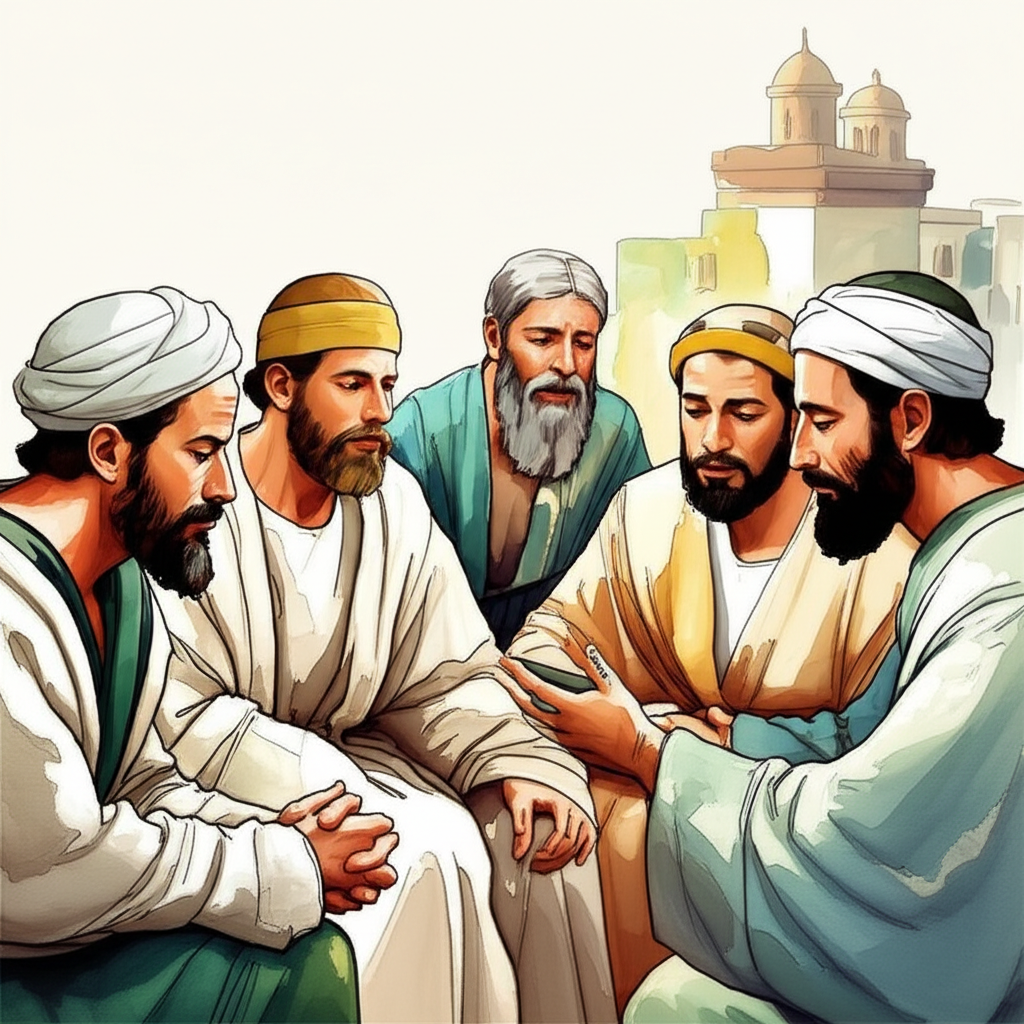
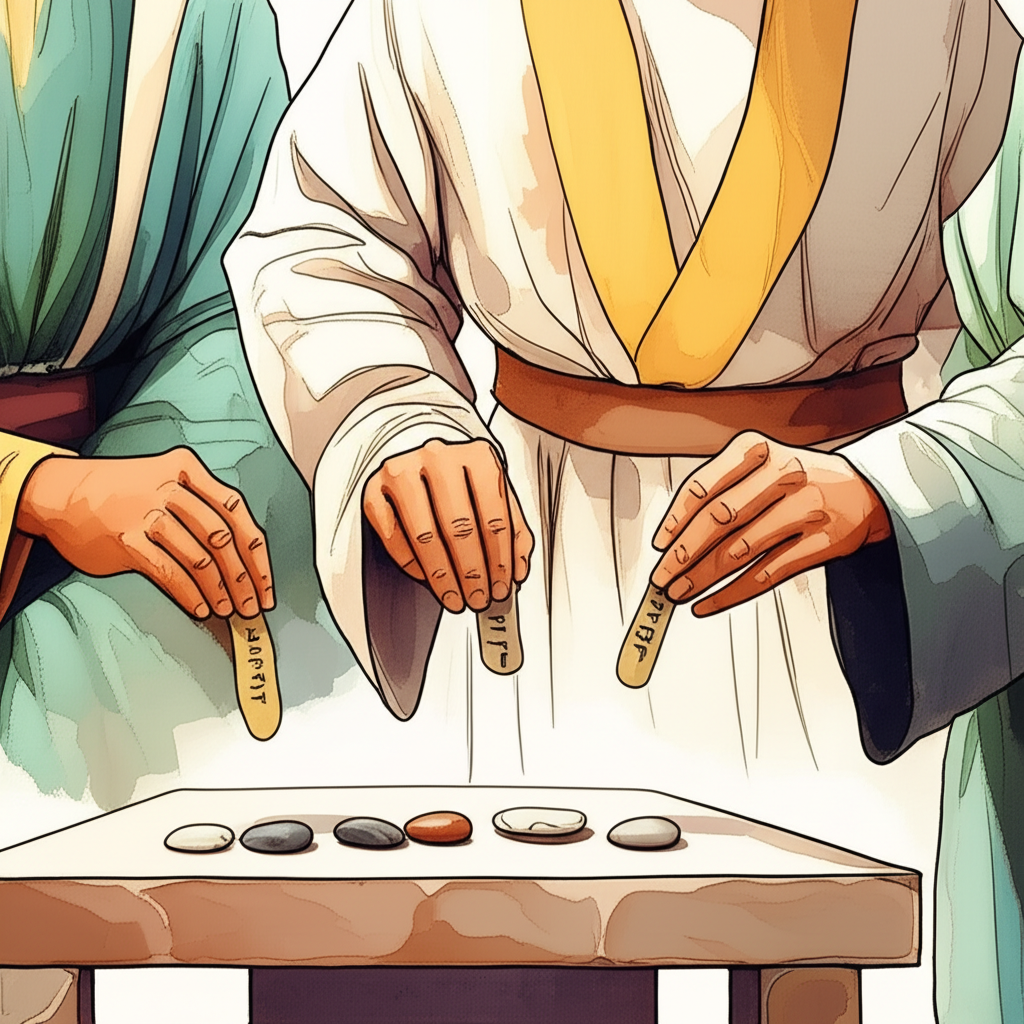
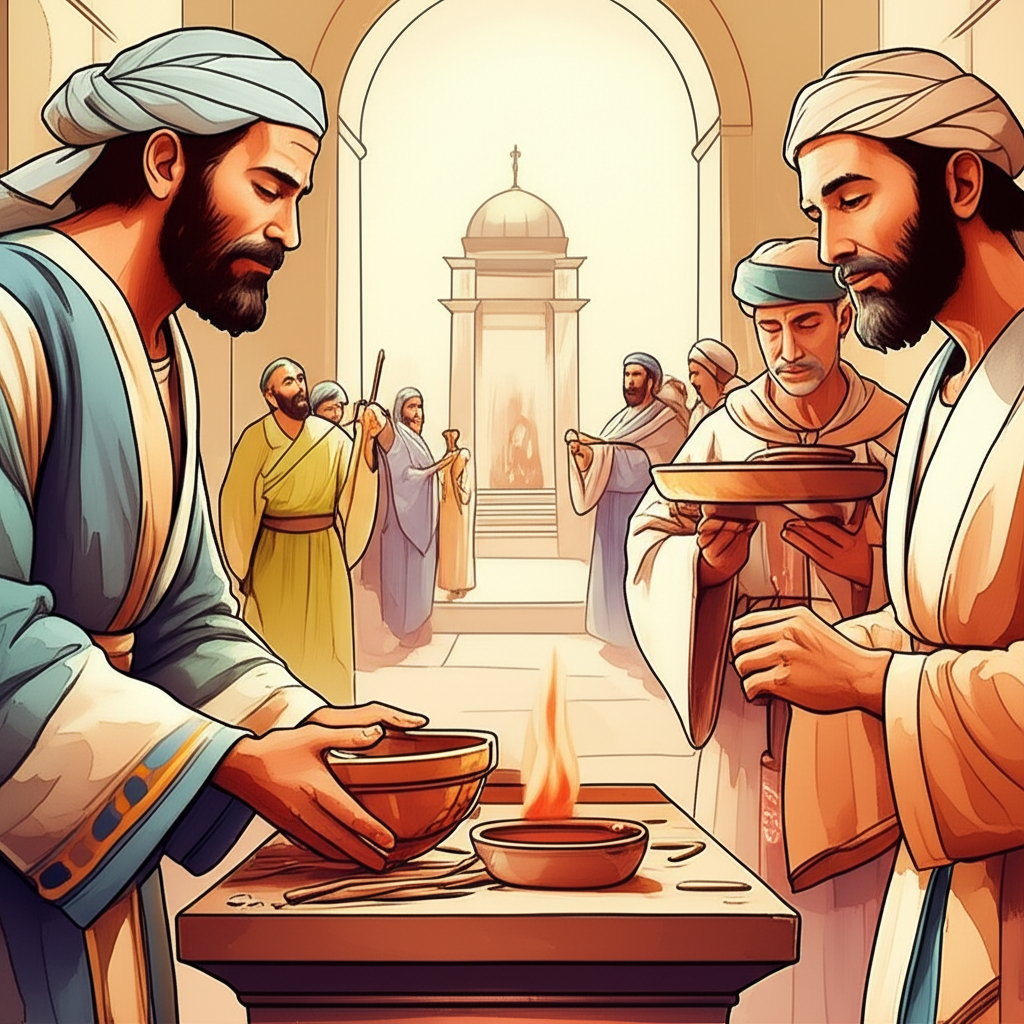

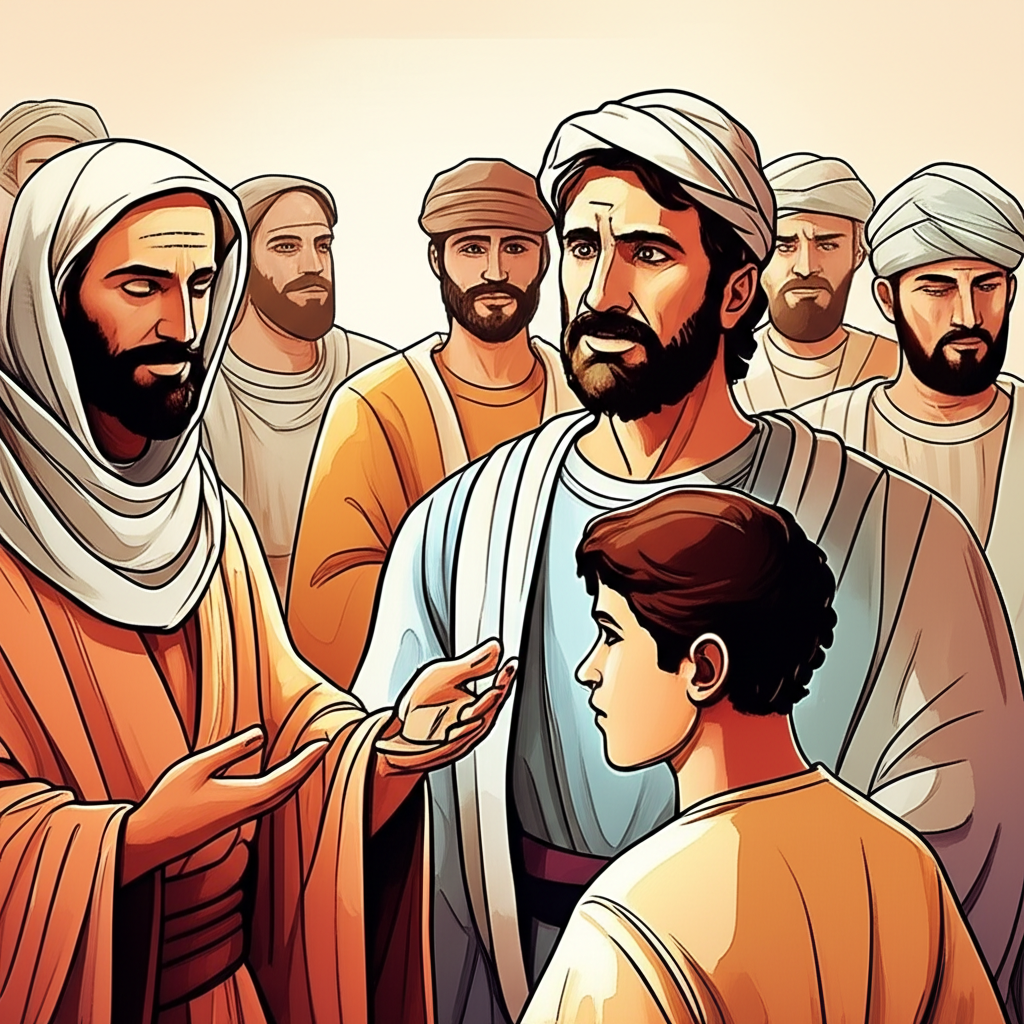
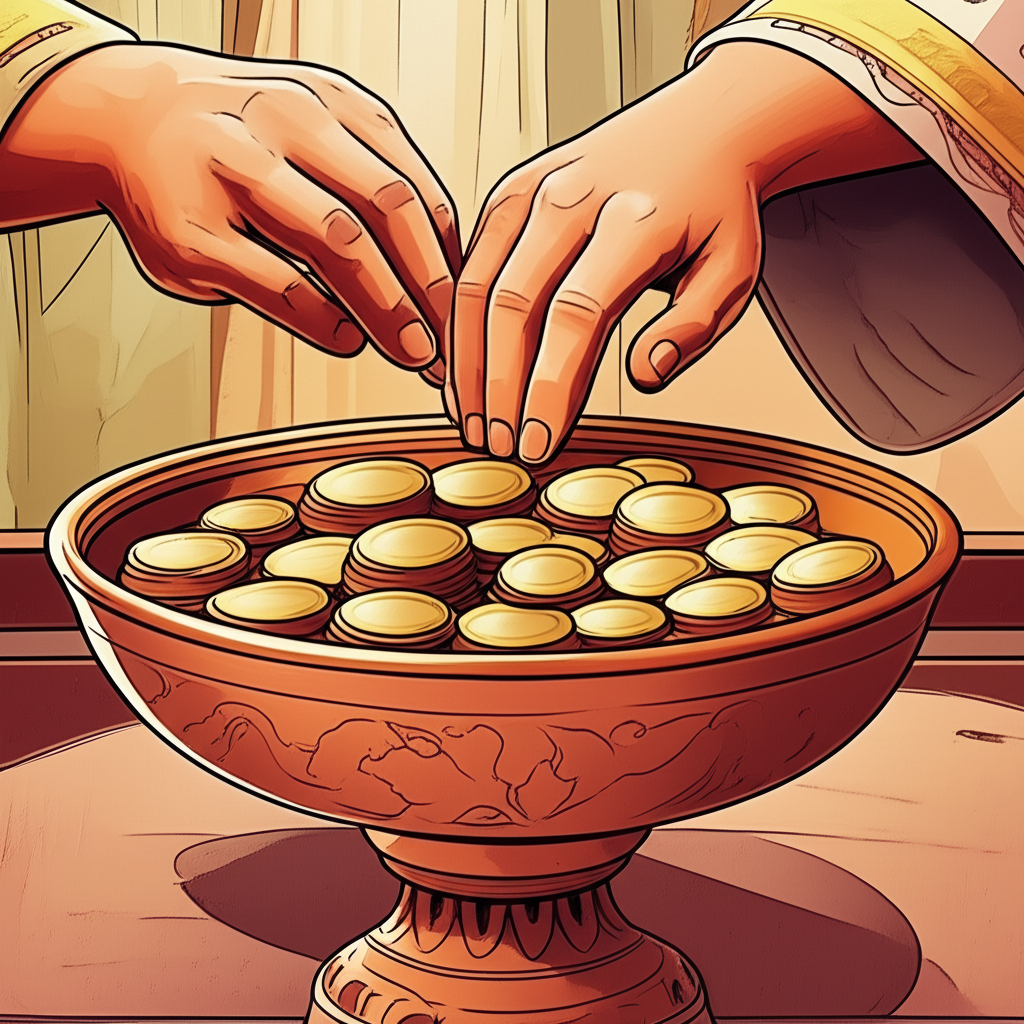
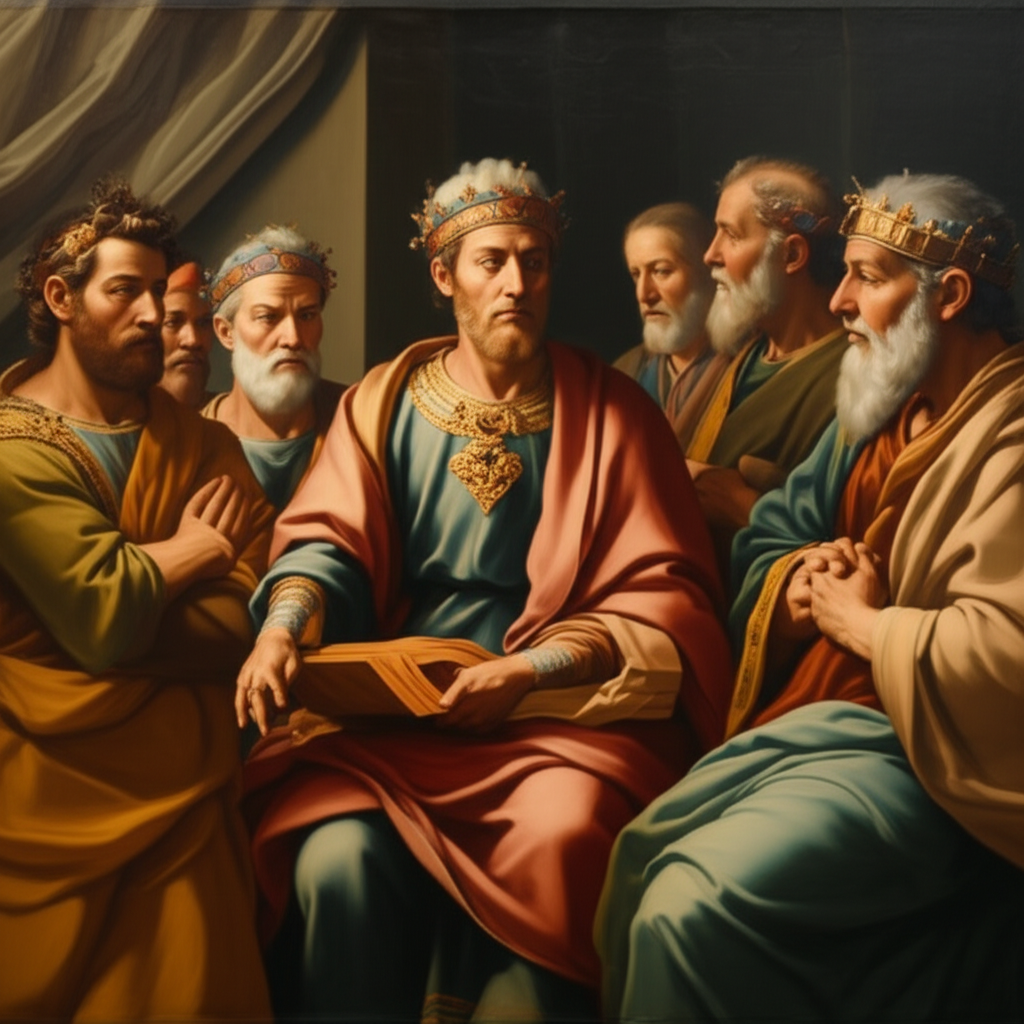
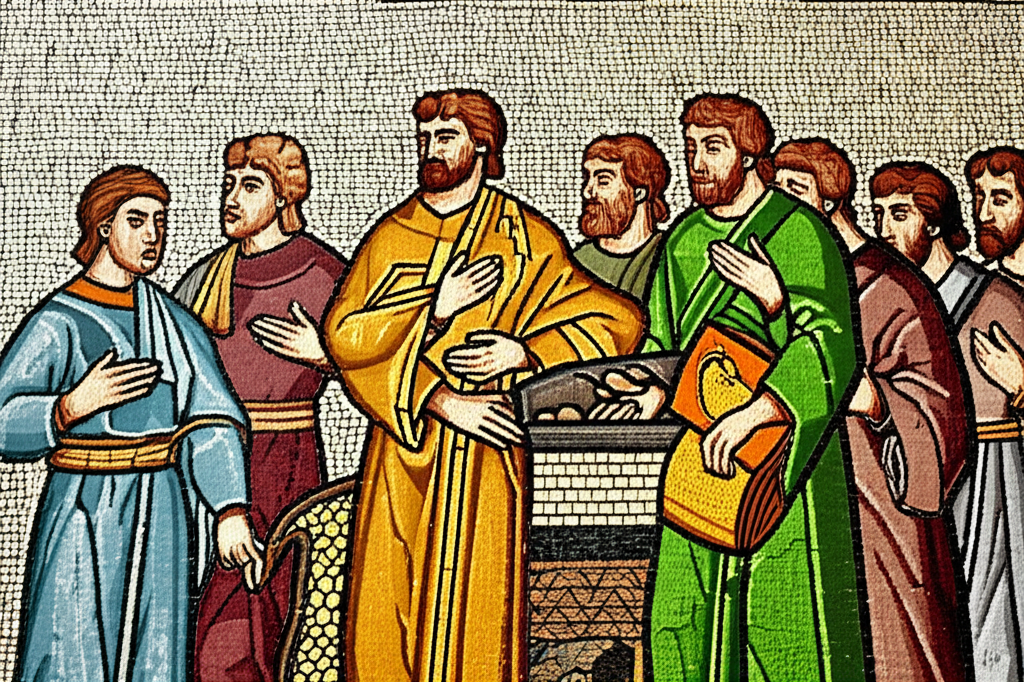
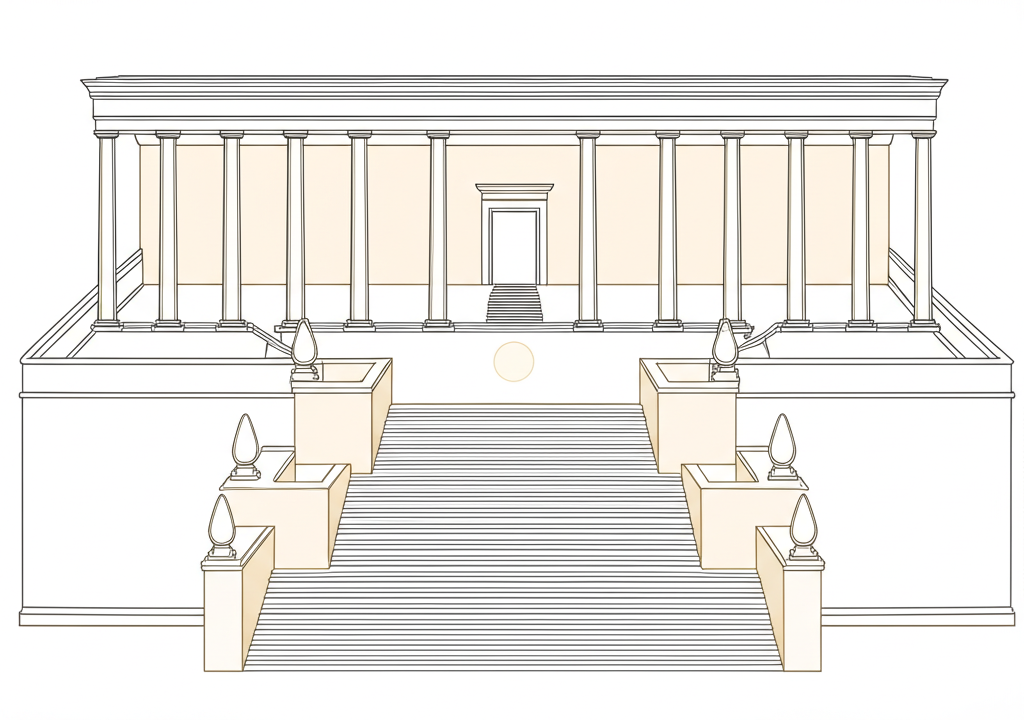
1 Chronicles chapter 24 kjv
- 1 Now these are the divisions of the sons of Aaron. The sons of Aaron; Nadab, and Abihu, Eleazar, and Ithamar.
- 2 But Nadab and Abihu died before their father, and had no children: therefore Eleazar and Ithamar executed the priest's office.
- 3 And David distributed them, both Zadok of the sons of Eleazar, and Ahimelech of the sons of Ithamar, according to their offices in their service.
- 4 And there were more chief men found of the sons of Eleazar than of the sons of Ithamar, and thus were they divided. Among the sons of Eleazar there were sixteen chief men of the house of their fathers, and eight among the sons of Ithamar according to the house of their fathers.
- 5 Thus were they divided by lot, one sort with another; for the governors of the sanctuary, and governors of the house of God, were of the sons of Eleazar, and of the sons of Ithamar.
- 6 And Shemaiah the son of Nethaneel the scribe, one of the Levites, wrote them before the king, and the princes, and Zadok the priest, and Ahimelech the son of Abiathar, and before the chief of the fathers of the priests and Levites: one principal household being taken for Eleazar, and one taken for Ithamar.
- 7 Now the first lot came forth to Jehoiarib, the second to Jedaiah,
- 8 The third to Harim, the fourth to Seorim,
- 9 The fifth to Malchijah, the sixth to Mijamin,
- 10 The seventh to Hakkoz, the eighth to Abijah,
- 11 The ninth to Jeshuah, the tenth to Shecaniah,
- 12 The eleventh to Eliashib, the twelfth to Jakim,
- 13 The thirteenth to Huppah, the fourteenth to Jeshebeab,
- 14 The fifteenth to Bilgah, the sixteenth to Immer,
- 15 The seventeenth to Hezir, the eighteenth to Aphses,
- 16 The nineteenth to Pethahiah, the twentieth to Jehezekel,
- 17 The one and twentieth to Jachin, the two and twentieth to Gamul,
- 18 The three and twentieth to Delaiah, the four and twentieth to Maaziah.
- 19 These were the orderings of them in their service to come into the house of the LORD, according to their manner, under Aaron their father, as the LORD God of Israel had commanded him.
- 20 And the rest of the sons of Levi were these: Of the sons of Amram; Shubael: of the sons of Shubael; Jehdeiah.
- 21 Concerning Rehabiah: of the sons of Rehabiah, the first was Isshiah.
- 22 Of the Izharites; Shelomoth: of the sons of Shelomoth; Jahath.
- 23 And the sons of Hebron; Jeriah the first, Amariah the second, Jahaziel the third, Jekameam the fourth.
- 24 Of the sons of Uzziel; Michah: of the sons of Michah; Shamir.
- 25 The brother of Michah was Isshiah: of the sons of Isshiah; Zechariah.
- 26 The sons of Merari were Mahli and Mushi: the sons of Jaaziah; Beno.
- 27 The sons of Merari by Jaaziah; Beno, and Shoham, and Zaccur, and Ibri.
- 28 Of Mahli came Eleazar, who had no sons.
- 29 Concerning Kish: the son of Kish was Jerahmeel.
- 30 The sons also of Mushi; Mahli, and Eder, and Jerimoth. These were the sons of the Levites after the house of their fathers.
- 31 These likewise cast lots over against their brethren the sons of Aaron in the presence of David the king, and Zadok, and Ahimelech, and the chief of the fathers of the priests and Levites, even the principal fathers over against their younger brethren.
1 Chronicles chapter 24 nkjv
- 1 Now these are the divisions of the sons of Aaron. The sons of Aaron were Nadab, Abihu, Eleazar, and Ithamar.
- 2 And Nadab and Abihu died before their father, and had no children; therefore Eleazar and Ithamar ministered as priests.
- 3 Then David with Zadok of the sons of Eleazar, and Ahimelech of the sons of Ithamar, divided them according to the schedule of their service.
- 4 There were more leaders found of the sons of Eleazar than of the sons of Ithamar, and thus they were divided. Among the sons of Eleazar were sixteen heads of their fathers' houses, and eight heads of their fathers' houses among the sons of Ithamar.
- 5 Thus they were divided by lot, one group as another, for there were officials of the sanctuary and officials of the house of God, from the sons of Eleazar and from the sons of Ithamar.
- 6 And the scribe, Shemaiah the son of Nethanel, one of the Levites, wrote them down before the king, the leaders, Zadok the priest, Ahimelech the son of Abiathar, and the heads of the fathers' houses of the priests and Levites, one father's house taken for Eleazar and one for Ithamar.
- 7 Now the first lot fell to Jehoiarib, the second to Jedaiah,
- 8 the third to Harim, the fourth to Seorim,
- 9 the fifth to Malchijah, the sixth to Mijamin,
- 10 the seventh to Hakkoz, the eighth to Abijah,
- 11 the ninth to Jeshua, the tenth to Shecaniah,
- 12 the eleventh to Eliashib, the twelfth to Jakim,
- 13 the thirteenth to Huppah, the fourteenth to Jeshebeab,
- 14 the fifteenth to Bilgah, the sixteenth to Immer,
- 15 the seventeenth to Hezir, the eighteenth to Happizzez,
- 16 the nineteenth to Pethahiah, the twentieth to Jehezekel,
- 17 the twenty-first to Jachin, the twenty-second to Gamul,
- 18 the twenty-third to Delaiah, the twenty-fourth to Maaziah.
- 19 This was the schedule of their service for coming into the house of the LORD according to their ordinance by the hand of Aaron their father, as the LORD God of Israel had commanded him.
- 20 And the rest of the sons of Levi: of the sons of Amram, Shubael; of the sons of Shubael, Jehdeiah.
- 21 Concerning Rehabiah, of the sons of Rehabiah, the first was Isshiah.
- 22 Of the Izharites, Shelomoth; of the sons of Shelomoth, Jahath.
- 23 Of the sons of Hebron, Jeriah was the first, Amariah the second, Jahaziel the third, and Jekameam the fourth.
- 24 Of the sons of Uzziel, Michah; of the sons of Michah, Shamir.
- 25 The brother of Michah, Isshiah; of the sons of Isshiah, Zechariah.
- 26 The sons of Merari were Mahli and Mushi; the son of Jaaziah, Beno.
- 27 The sons of Merari by Jaaziah were Beno, Shoham, Zaccur, and Ibri.
- 28 Of Mahli: Eleazar, who had no sons.
- 29 Of Kish: the son of Kish, Jerahmeel.
- 30 Also the sons of Mushi were Mahli, Eder, and Jerimoth. These were the sons of the Levites according to their fathers' houses.
- 31 These also cast lots just as their brothers the sons of Aaron did, in the presence of King David, Zadok, Ahimelech, and the heads of the fathers' houses of the priests and Levites. The chief fathers did just as their younger brethren.
1 Chronicles chapter 24 niv
- 1 These were the divisions of the descendants of Aaron: The sons of Aaron were Nadab, Abihu, Eleazar and Ithamar.
- 2 But Nadab and Abihu died before their father did, and they had no sons; so Eleazar and Ithamar served as the priests.
- 3 With the help of Zadok a descendant of Eleazar and Ahimelek a descendant of Ithamar, David separated them into divisions for their appointed order of ministering.
- 4 A larger number of leaders were found among Eleazar's descendants than among Ithamar's, and they were divided accordingly: sixteen heads of families from Eleazar's descendants and eight heads of families from Ithamar's descendants.
- 5 They divided them impartially by casting lots, for there were officials of the sanctuary and officials of God among the descendants of both Eleazar and Ithamar.
- 6 The scribe Shemaiah son of Nethanel, a Levite, recorded their names in the presence of the king and of the officials: Zadok the priest, Ahimelek son of Abiathar and the heads of families of the priests and of the Levites?one family being taken from Eleazar and then one from Ithamar.
- 7 The first lot fell to Jehoiarib, the second to Jedaiah,
- 8 the third to Harim, the fourth to Seorim,
- 9 the fifth to Malkijah, the sixth to Mijamin,
- 10 the seventh to Hakkoz, the eighth to Abijah,
- 11 the ninth to Jeshua, the tenth to Shekaniah,
- 12 the eleventh to Eliashib, the twelfth to Jakim,
- 13 the thirteenth to Huppah, the fourteenth to Jeshebeab,
- 14 the fifteenth to Bilgah, the sixteenth to Immer,
- 15 the seventeenth to Hezir, the eighteenth to Happizzez,
- 16 the nineteenth to Pethahiah, the twentieth to Jehezkel,
- 17 the twenty-first to Jakin, the twenty-second to Gamul,
- 18 the twenty-third to Delaiah and the twenty-fourth to Maaziah.
- 19 This was their appointed order of ministering when they entered the temple of the LORD, according to the regulations prescribed for them by their ancestor Aaron, as the LORD, the God of Israel, had commanded him.
- 20 As for the rest of the descendants of Levi: from the sons of Amram: Shubael; from the sons of Shubael: Jehdeiah.
- 21 As for Rehabiah, from his sons: Ishiah was the first.
- 22 From the Izharites: Shelomoth; from the sons of Shelomoth: Jahath.
- 23 The sons of Hebron: Jeriah the first, Amariah the second, Jahaziel the third and Jekameam the fourth.
- 24 The son of Uzziel: Micah; from the sons of Micah: Shamir.
- 25 The brother of Micah: Ishiah; from the sons of Ishiah: Zechariah.
- 26 The sons of Merari: Mahli and Mushi. The son of Jaaziah: Beno.
- 27 The sons of Merari: from Jaaziah: Beno, Shoham, Zakkur and Ibri.
- 28 From Mahli: Eleazar, who had no sons.
- 29 From Kish: the son of Kish: Jerahmeel.
- 30 And the sons of Mushi: Mahli, Eder and Jerimoth. These were the Levites, according to their families.
- 31 They also cast lots, just as their relatives the descendants of Aaron did, in the presence of King David and of Zadok, Ahimelek, and the heads of families of the priests and of the Levites. The families of the oldest brother were treated the same as those of the youngest.
1 Chronicles chapter 24 esv
- 1 The divisions of the sons of Aaron were these. The sons of Aaron: Nadab, Abihu, Eleazar, and Ithamar.
- 2 But Nadab and Abihu died before their father and had no children, so Eleazar and Ithamar became the priests.
- 3 With the help of Zadok of the sons of Eleazar, and Ahimelech of the sons of Ithamar, David organized them according to the appointed duties in their service.
- 4 Since more chief men were found among the sons of Eleazar than among the sons of Ithamar, they organized them under sixteen heads of fathers' houses of the sons of Eleazar, and eight of the sons of Ithamar.
- 5 They divided them by lot, all alike, for there were sacred officers and officers of God among both the sons of Eleazar and the sons of Ithamar.
- 6 And the scribe Shemaiah, the son of Nethanel, a Levite, recorded them in the presence of the king and the princes and Zadok the priest and Ahimelech the son of Abiathar and the heads of the fathers' houses of the priests and of the Levites, one father's house being chosen for Eleazar and one chosen for Ithamar.
- 7 The first lot fell to Jehoiarib, the second to Jedaiah,
- 8 the third to Harim, the fourth to Seorim,
- 9 the fifth to Malchijah, the sixth to Mijamin,
- 10 the seventh to Hakkoz, the eighth to Abijah,
- 11 the ninth to Jeshua, the tenth to Shecaniah,
- 12 the eleventh to Eliashib, the twelfth to Jakim,
- 13 the thirteenth to Huppah, the fourteenth to Jeshebeab,
- 14 the fifteenth to Bilgah, the sixteenth to Immer,
- 15 the seventeenth to Hezir, the eighteenth to Happizzez,
- 16 the nineteenth to Pethahiah, the twentieth to Jehezkel,
- 17 the twenty-first to Jachin, the twenty-second to Gamul,
- 18 the twenty-third to Delaiah, the twenty-fourth to Maaziah.
- 19 These had as their appointed duty in their service to come into the house of the LORD according to the procedure established for them by Aaron their father, as the LORD God of Israel had commanded him.
- 20 And of the rest of the sons of Levi: of the sons of Amram, Shubael; of the sons of Shubael, Jehdeiah.
- 21 Of Rehabiah: of the sons of Rehabiah, Isshiah the chief.
- 22 Of the Izharites, Shelomoth; of the sons of Shelomoth, Jahath.
- 23 The sons of Hebron: Jeriah the chief, Amariah the second, Jahaziel the third, Jekameam the fourth.
- 24 The sons of Uzziel, Micah; of the sons of Micah, Shamir.
- 25 The brother of Micah, Isshiah; of the sons of Isshiah, Zechariah.
- 26 The sons of Merari: Mahli and Mushi. The sons of Jaaziah: Beno.
- 27 The sons of Merari: of Jaaziah, Beno, Shoham, Zaccur, and Ibri.
- 28 Of Mahli: Eleazar, who had no sons.
- 29 Of Kish, the sons of Kish: Jerahmeel.
- 30 The sons of Mushi: Mahli, Eder, and Jerimoth. These were the sons of the Levites according to their fathers' houses.
- 31 These also, the head of each father's house and his younger brother alike, cast lots, just as their brothers the sons of Aaron, in the presence of King David, Zadok, Ahimelech, and the heads of fathers' houses of the priests and of the Levites.
1 Chronicles chapter 24 nlt
- 1 This is how Aaron's descendants, the priests, were divided into groups for service. The sons of Aaron were Nadab, Abihu, Eleazar, and Ithamar.
- 2 But Nadab and Abihu died before their father, and they had no sons. So only Eleazar and Ithamar were left to carry on as priests.
- 3 With the help of Zadok, who was a descendant of Eleazar, and of Ahimelech, who was a descendant of Ithamar, David divided Aaron's descendants into groups according to their various duties.
- 4 Eleazar's descendants were divided into sixteen groups and Ithamar's into eight, for there were more family leaders among the descendants of Eleazar.
- 5 All tasks were assigned to the various groups by means of sacred lots so that no preference would be shown, for there were many qualified officials serving God in the sanctuary from among the descendants of both Eleazar and Ithamar.
- 6 Shemaiah son of Nethanel, a Levite, acted as secretary and wrote down the names and assignments in the presence of the king, the officials, Zadok the priest, Ahimelech son of Abiathar, and the family leaders of the priests and Levites. The descendants of Eleazar and Ithamar took turns casting lots.
- 7 The first lot fell to Jehoiarib.
The second lot fell to Jedaiah. - 8 The third lot fell to Harim.
The fourth lot fell to Seorim. - 9 The fifth lot fell to Malkijah.
The sixth lot fell to Mijamin. - 10 The seventh lot fell to Hakkoz.
The eighth lot fell to Abijah. - 11 The ninth lot fell to Jeshua.
The tenth lot fell to Shecaniah. - 12 The eleventh lot fell to Eliashib.
The twelfth lot fell to Jakim. - 13 The thirteenth lot fell to Huppah.
The fourteenth lot fell to Jeshebeab. - 14 The fifteenth lot fell to Bilgah.
The sixteenth lot fell to Immer. - 15 The seventeenth lot fell to Hezir.
The eighteenth lot fell to Happizzez. - 16 The nineteenth lot fell to Pethahiah.
The twentieth lot fell to Jehezkel. - 17 The twenty-first lot fell to Jakin.
The twenty-second lot fell to Gamul. - 18 The twenty-third lot fell to Delaiah.
The twenty-fourth lot fell to Maaziah. - 19 Each group carried out its appointed duties in the house of the LORD according to the procedures established by their ancestor Aaron in obedience to the commands of the LORD, the God of Israel.
- 20 These were the other family leaders descended from Levi: From the descendants of Amram, the leader was Shebuel.
From the descendants of Shebuel, the leader was Jehdeiah. - 21 From the descendants of Rehabiah, the leader was Isshiah.
- 22 From the descendants of Izhar, the leader was Shelomith.
From the descendants of Shelomith, the leader was Jahath. - 23 From the descendants of Hebron, Jeriah was the leader, Amariah was second, Jahaziel was third, and Jekameam was fourth.
- 24 From the descendants of Uzziel, the leader was Micah.
From the descendants of Micah, the leader was Shamir, - 25 along with Isshiah, the brother of Micah.
From the descendants of Isshiah, the leader was Zechariah. - 26 From the descendants of Merari, the leaders were Mahli and Mushi.
From the descendants of Jaaziah, the leader was Beno. - 27 From the descendants of Merari through Jaaziah, the leaders were Beno, Shoham, Zaccur, and Ibri.
- 28 From the descendants of Mahli, the leader was Eleazar, though he had no sons.
- 29 From the descendants of Kish, the leader was Jerahmeel.
- 30 From the descendants of Mushi, the leaders were Mahli, Eder, and Jerimoth.
These were the descendants of Levi in their various families. - 31 Like the descendants of Aaron, they were assigned to their duties by means of sacred lots, without regard to age or rank. Lots were drawn in the presence of King David, Zadok, Ahimelech, and the family leaders of the priests and the Levites.
- Bible Book of 1 Chronicles
- 1 Adam to Noah and Abraham
- 2 Lineage of King David Tribe of Judah
- 3 King David Children
- 4 Descendants of Judah
- 5 Descendants of Reuben
- 6 Sons of Levi The Priestly Line
- 7 Descendants of Issachar
- 8 A Genealogy of Saul
- 9 A Genealogy of the Returned Exiles
- 10 The Death of King Saul
- 11 David Anointed King
- 12 The Mighty Men Join David
- 13 The Ark Brought from Kiriath-Jearim
- 14 David's Wives and Children
- 15 The Ark Brought to Jerusalem
- 16 The Ark Placed in a Tent
- 17 The Lord's Covenant with David
- 18 David Defeats His Enemies
- 19 The Ammonites Disgrace David's Men
- 20 The Capture of Rabbah
- 21 David's Census Brings Pestilence
- 22 David Prepares for Temple Building
- 23 David Organizes the Levites
- 24 24 Courses of Priests
- 25 David Organizes the Musicians
- 26 Divisions of the Gatekeepers
- 27 Military Divisions
- 28 David's Charge to Israel
- 29 Offerings for the Temple